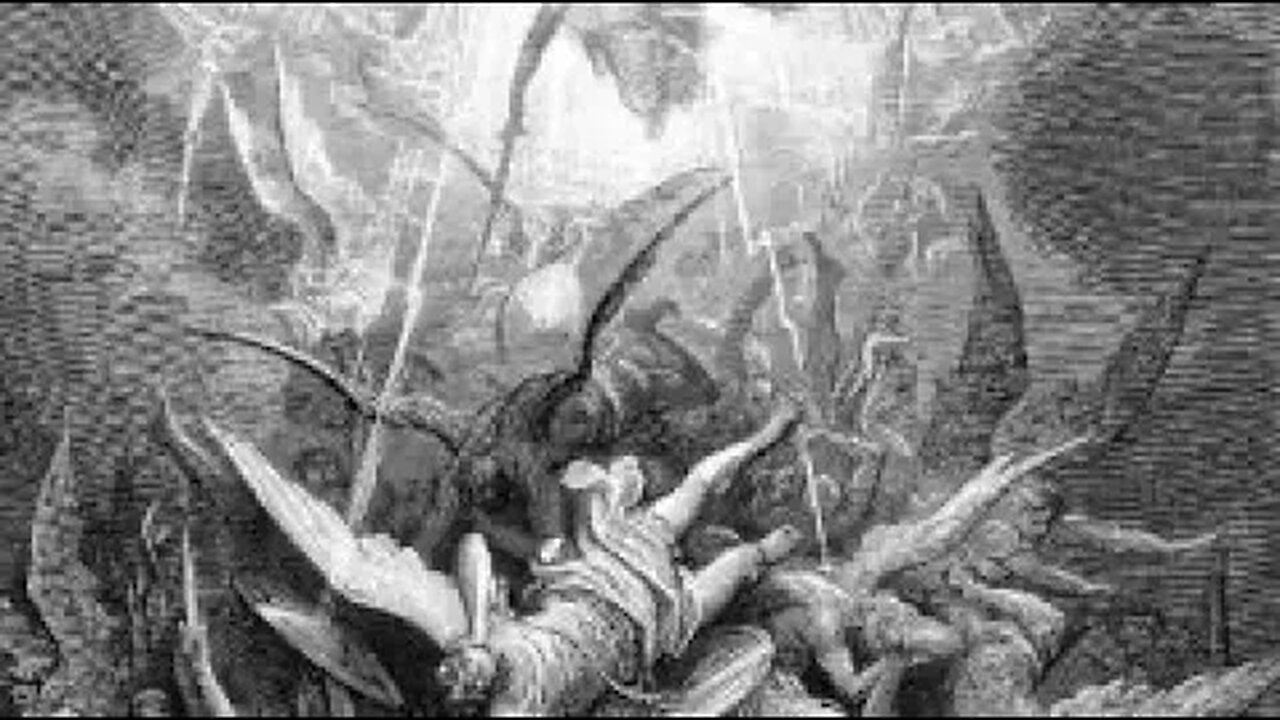Premium Only Content

Grizzly Talks Directly To Ghost Hunters About Satan and Fallen Angels
We know the Bible mentions demons many times, but what exactly are they? Are they fallen angels, or a coded reference to something else? Here's what the Bible says about their origins and powers.
Lisa Loraine Baker
Contributing Writer
2022
2 Nov
Are Demons Really Fallen Angels?
The world is full of varying depictions of the devil—from a monstrous-looking red being with horns, cloven hooves, and a twisting, pointed tail to an almost cherubic, harmless-looking animation with a cute smile. Some people even refuse to believe in the devil and his minions. Demons are spoken of as angels who, when Satan fell, changed from good to bad as they followed him. They are also said to be subject to him. But are they? And are demons really fallen angels?
Where Does the Bible Mention Demons?
The Bible has much to say about demons, and we find them spoken of (as demons) in all four of the Gospels. The Gospels mention them concerning Jesus ridding people of them (Matthew 8:28; Mark 5:15; Luke 4:35) or the Jewish religious leaders claiming Jesus had a demon (John 8:49).
Synonyms the Bible uses to describe demons include those employed by Paul in Ephesians 6:12: the rulers, the authorities, the cosmic powers over this present darkness, and the spiritual forces of evil in the heavenly places. Other terms include unclean spirits (Matthew 12:43), Legion (Luke 8:30), a “spirit of divination” (Acts 16:16), evil spirits (Luke 7:21), and “the devil and his angels (Matthew 25:41). At times, as seen in the Acts passage, the demons are called by what they attempt to do.
Most mentions of the term demon occur in the New Testament. However, they are present in the Old Testament as well, as seen in Leviticus 17:7, Deuteronomy 32:17, and Psalm 106:37. In other parts of the Old Testament, some evil beings are called gods (1 Samuel 28:13; Isaiah 8:19) and are acknowledged as demonic spirits because they are linked with the deceased. Another Old Testament term commonly referred to as a demon is azazel (Leviticus 16:8, 10, 26).
What Does the Bible Say about Fallen Angels?
As followers (and we all follow something or someone), we emulate our leader. As Christians, Jesus Christ is our leader. He is our Lord (Revelation 17:14), the Author and Perfecter of our faith (Hebrews 12:2). One of our main goals is to become like Him (Romans 8:29; 1 John 3:2). Demons take a different course because, they are fallen angels—those who fell with Satan when he was banished from God’s presence in heaven (Revelation 12:3-4). Being fallen angels, demons are spiritual beings (Matthew 10:1). They are also enemies of God (Revelation 12:9) with limited power over men (Revelation 16:14).
When Satan fell, one-third of the angels in heaven followed him, and they serve him to their ultimate demise (Luke 10:18; Revelation 12:3-4, 12:7-9; 18:2, 21). Barry Cooper states, “Demons are angels who fell with Satan who was, of course, an angel himself. They were those who had taken sides with Satan in his rebellion against God. Talk about being on the wrong side of history.”
Matthew 25:41 tells us what happens to demons; they will depart as cursed and be placed in the “eternal fire prepared for the devil and his angels.”
Is Satan a Fallen Angel?
Satan gained his notorious name when he fell from heaven. We must be careful with the interpretation of problematic texts. However, given its context, the prophet seems to refer to Satan in Ezekiel 28:1-19. The descriptions used cannot fit a human (King of Tyre). Yes, there existed a certain king over Tyre, but we can reckon Ezekiel seems to have moved past a human understanding to describe Satan’s fall from heaven. A human cannot be described in the Bible as “perfect in beauty” or having been in Eden as an anointed, guardian cherub. This being is also described as having walked in the midst of the stones of fire (See Daniel 7:9), an allusion to being before the very throne of God. No human king has ever been in such a position.
Many believe Satan’s name before his fall was Lucifer, taken from the Hebrew word Helel. Don Stewart explains, “When this Hebrew term was translated into Latin, the word lucifero was used. Lucifero basically means ‘to shine.’ Therefore, if this term is understood to be a proper name of the king of Babylon, that name, in Latin, would be Lucifer.”
If the Ezekiel passage speaks of Satan, we can infer the following:
- He was the seal of perfection, wise, and perfect in beauty.
- He was in Eden, and his appearance was likened to precious stones.
- He was an anointed guardian cherub.
- He was in God’s presence.
- He is a created being.
- He was blameless until unrighteousness was found in him.
- He became and is a creature of violence, deception, and sin.
- God cast him out of heaven.
- Pride was his sin and caused his fall.
- He will come to a “dreadful end and will be found no more forever” (Ezekiel 28:19).
-
 8:10
8:10
WhaddoYouMeme
1 day ago $0.06 earnedChristians, Before You See “Testament”, Watch this!
7.36K4 -
 8:42
8:42
Freedom Frontline
15 hours agoDurbin’s Trump Smear Video Just HUMILIATED Him in the Senate
9.21K4 -
 10:56
10:56
ariellescarcella
12 hours agoThe Shocking Divide Among College Voters Sparks Worry For America
7.57K6 -
 13:09
13:09
Forrest Galante
11 hours agoWildlife Expert Reacts To Deadly Australian Animal TikToks
53.5K9 -
 12:08
12:08
Zoufry
2 days agoThe Mystery of Gaddafi's Final 24 Hours
14.7K11 -
 18:25
18:25
Liberty Hangout
13 days agoAnti-Ice Demonstrators Love Poop!
52.4K71 -
 9:39
9:39
MattMorseTV
17 hours ago $1.14 earnedVance just DROPPED a BOMBSHELL.
45.8K67 -
 23:47
23:47
GritsGG
1 day agoThe Forgotten Best Sniper Support AR!
19.2K3 -
 1:15:48
1:15:48
The Pascal Show
19 hours ago $0.12 earnedMUGSHOTS RELEASED! Emmanuel Haro's Parents Mugshot Released To The Public
14.8K1 -
 14:45
14:45
BlabberingCollector
22 hours agoKings Cross Station SET LEAKS! | Harry Potter HBO Show Update & News
13.7K1